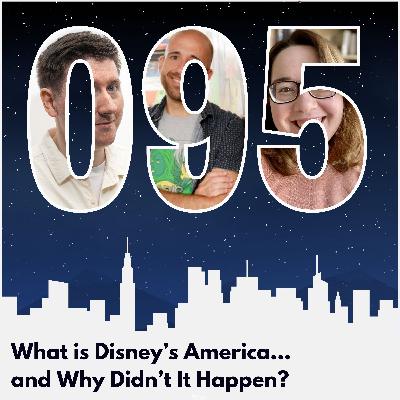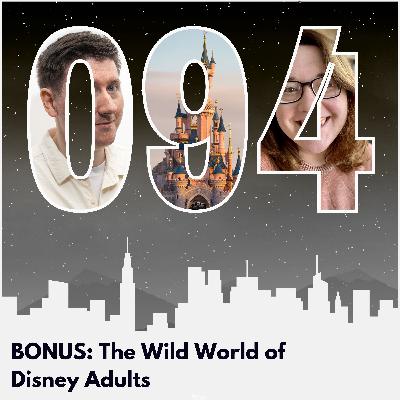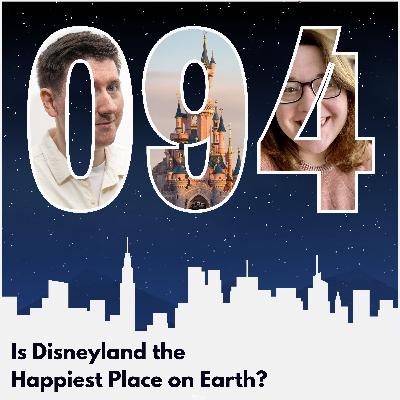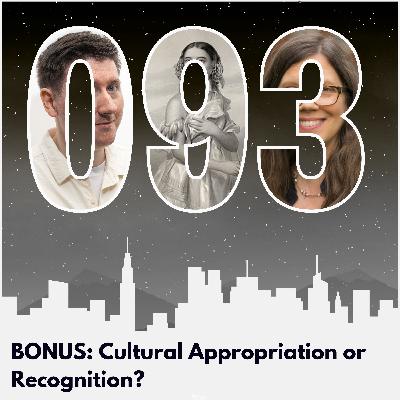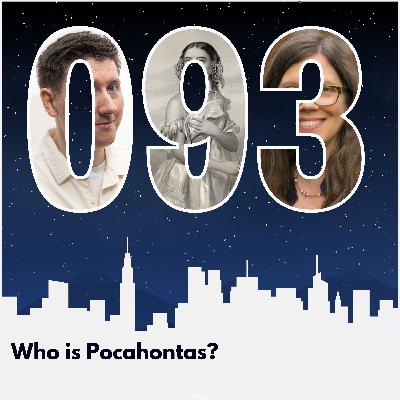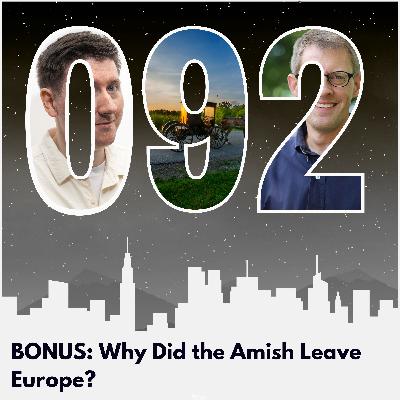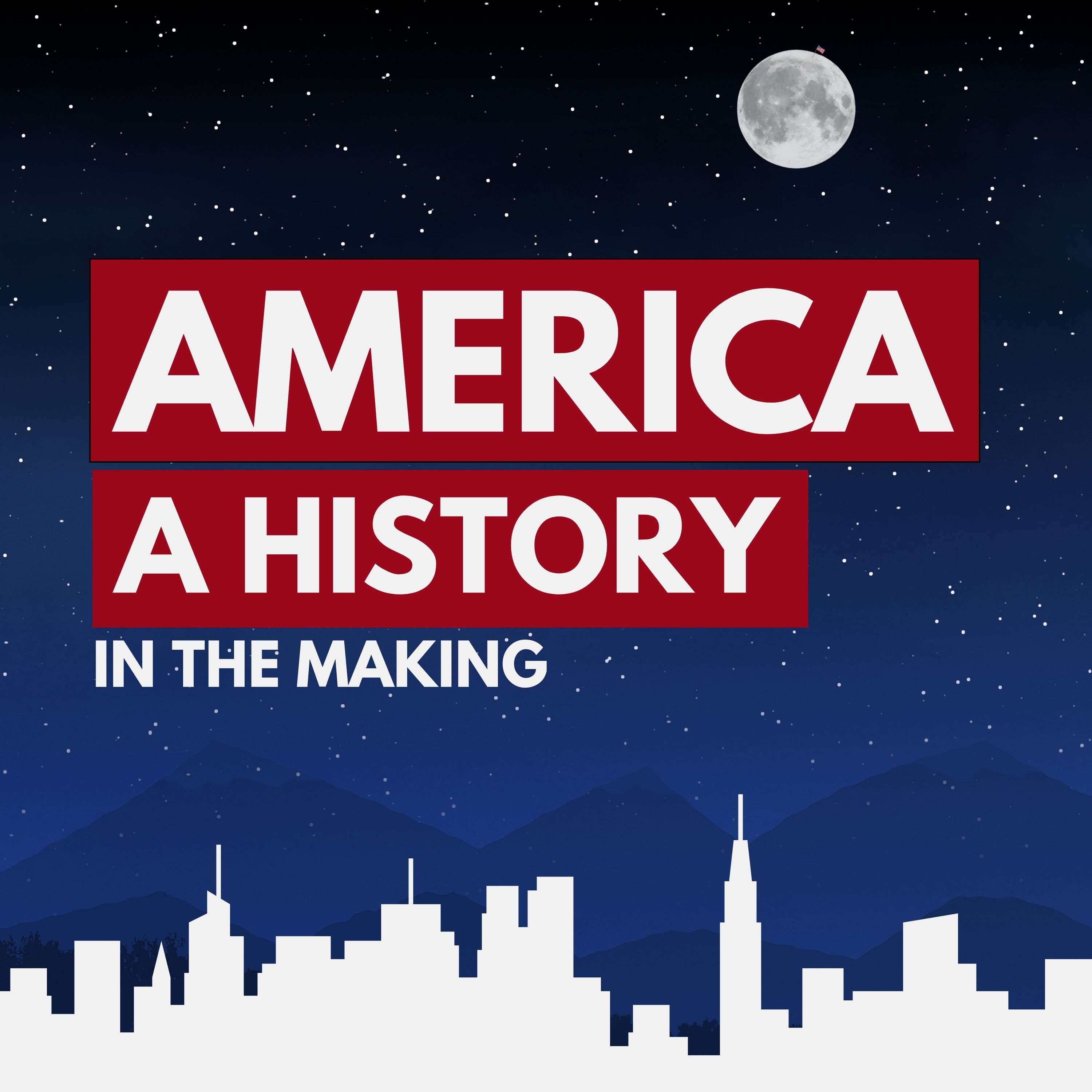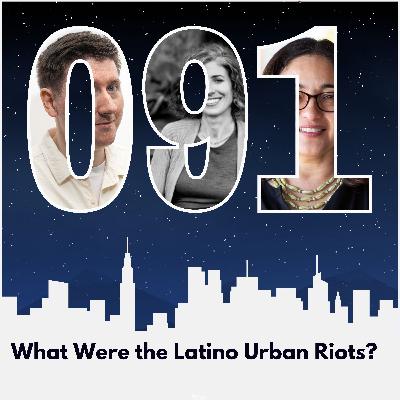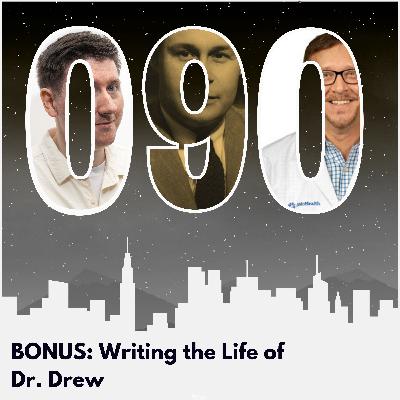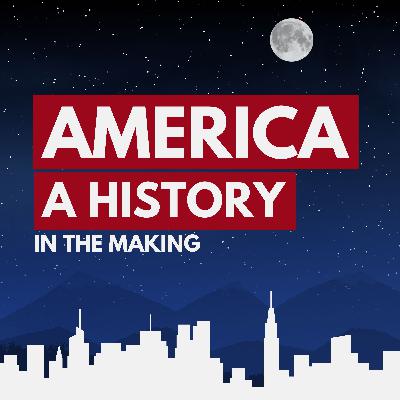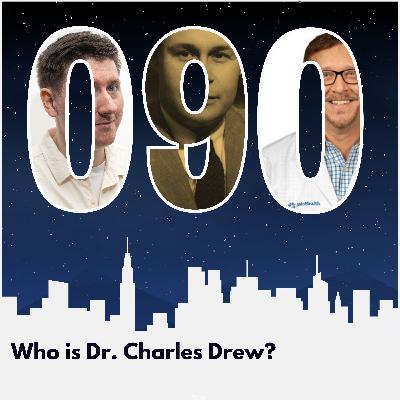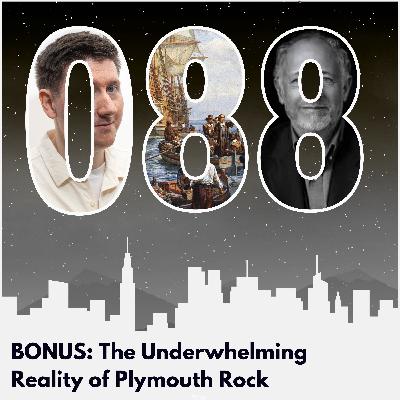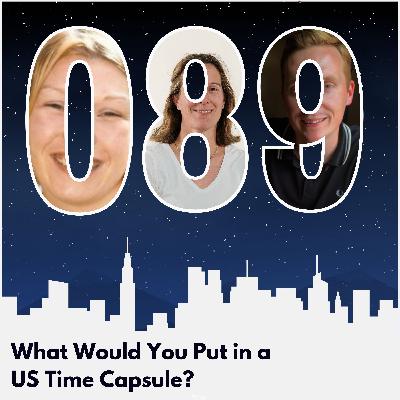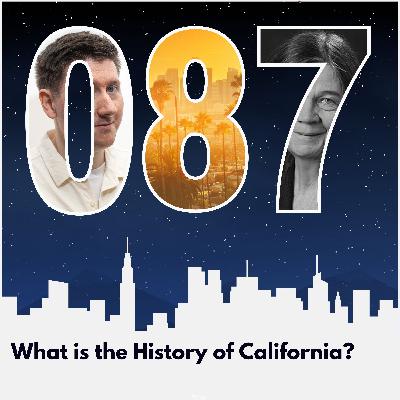Discover America: A History
America: A History

America: A History
Author: Liam Heffernan
Subscribed: 38Played: 641Subscribe
Share
© Mercury Podcasts
Description
The number one American history podcast for anyone with an interest in the people and events that shaped the USA. Every week, Liam Heffernan is joined by the world's foremost experts, academics and broadcasters in the only podcast that connects US past, present and future... and tries to make some sense out of it!
.
From the founding fathers to contemporary politics, we connect historical events to current issues, making American history accessible and relevant. Perfect for students, educators, and anyone passionate about understanding how America became the nation it is today.
.
New episodes weekly featuring in-depth analysis, expert commentary, and compelling storytelling that makes history come alive.
.
America: A History is a part of the Mercury Podcast Network, hosted by your resident US expert Liam Heffernan, in collaboration with the University of East Anglia.
.
Support the show here: https://america-a-history.captivate.fm/support
For advertising and brand enquiries: liam@mercurypodcasts.com
For comments, suggestions, and opinions: america@podcastsbyliam.com
.
From the founding fathers to contemporary politics, we connect historical events to current issues, making American history accessible and relevant. Perfect for students, educators, and anyone passionate about understanding how America became the nation it is today.
.
New episodes weekly featuring in-depth analysis, expert commentary, and compelling storytelling that makes history come alive.
.
America: A History is a part of the Mercury Podcast Network, hosted by your resident US expert Liam Heffernan, in collaboration with the University of East Anglia.
.
Support the show here: https://america-a-history.captivate.fm/support
For advertising and brand enquiries: liam@mercurypodcasts.com
For comments, suggestions, and opinions: america@podcastsbyliam.com
166 Episodes
Reverse
Last week, I asked if Disneyland was the happiest place on Earth.Well, this week, we’re looking at the Disney theme park that never was. The concept for a historical theme park was initially earmarked for Virginia, but less than a year after being announced, it was scrapped. But why?What was so different about this park compared to others? What was the public reaction? And when Disney was able to launch other parks, even cruise ships, and anything else it wanted, what went so spectacularly wrong with this?So this week, I want to know… what was Disney’s America… and why didn’t it happen?...Special guest for this episode:Jared Bahir Browsh, an Assistant Teaching Professor, cultural historian, and author at the University of Colorado, Boulder, with an interest in the relationship between culture, money, power, and identity in the United States and globally. His piece on The Conversation about the collapse of Disney’s America.Sabrina Mittermeier, a research associate at the University of Kassel with a focus on theme parks. Her books include A Cultural History of the Disneyland Theme Parks: Middle Class Kingdoms, and she also wrote a paper specifically on Disney’s America....Highlights from this episode:Disney's America was an ambitious project aimed at creating an immersive historical theme park, but ultimately it faced significant backlash and was cancelled due to various cultural and financial factors.The early 90s were a transformative time for Disney, with a strong emphasis on capitalism and expansion, and Disney's America was seen as a reflection of that cultural landscape.Critics pointed out that Disney's America struggled to balance entertainment with the complexities of American history, leading to concerns about how history would be portrayed in a theme park setting.The failure of Disney's America highlighted the challenges of creating a theme park that deals with serious historical themes, especially in a location close to significant Civil War battlefields and historical sites....Additional Resources:Inside the collapse of Disney’s America, the US history-themed park that almost was by Jared Bahir Browsh“Windows to the Past”: Disney’s America, the Culture Wars, and the Question of Edutainment by Sabrina MittermeierStaging a Comeback: Broadway, Hollywood, and the Disney Renaissance by Peter Kunze...And if you like this episode, you might also love:What Makes Country Music so American?Are the Oscars Still Relevant?Why Does Everyone Love Disney?Could Friends BE Any Bigger?How Accurate is Forrest Gump?...SUPPORT THE SHOWIndividual Supporters: https://america-a-history.captivate.fm/support University Partners: https://america-a-history.captivate.fm/partnershipsBrand...
In this bonus episode, we continue our foray into Disney theme parks, discussing the culture of Disney Adults and our favourite parks and rides.What are yours?Email america@podcastsbyliam.com with your opinions, or leave a comment on Spotify and you might be featured on the show next week....Special guest for this episode:Sabrina Mittermeier, a research associate at the University of Kassel following a PhD in American Cultural History, with a focus on theme parks. Her books include A Cultural History of the Disneyland Theme Parks: Middle Class Kingdoms, and she is one of the foremost academics on all things Disneyland....Highlights from this episode:The concept of 'Disney adults' has exploded on social media, especially TikTok, showcasing a unique subculture.Sabrina's deep dive into Disney fandom reveals both the joys and absurdities of adult fans.Disney parks have become a global phenomenon, shaping pop culture and immersive entertainment experiences.There's a strong argument that Disney has fundamentally influenced animation and entertainment worldwide.Many fans of Disney have formed lasting friendships through their shared passion for the parks.Controversies surrounding Disney weddings highlight the divide between casual visitors and dedicated fans....Additional Resources:A Cultural History of the Disneyland Theme Parks: Middle Class Kingdoms by Sabrina MittermeierFan Phenomena: Disney edited by Sabrina MittermeierUnderstanding Disney: The Manufacture of Fantasy by Janet WaskoIn Front of Ira by Sabrina Mittermeier and Torsten Kathke...And if you like this episode, you might also love:What Makes Country Music so American?Are the Oscars Still Relevant?Why Does Everyone Love Disney?Could Friends BE Any Bigger?How Accurate is Forrest...
When Disneyland opened its gates in Anaheim in 1955, it immediately captivated generations of visitors. With seventy years under its belt, its evolution into a sprawling empire of twelve theme parks and six resorts has raked in hundreds of billions of dollars. But have you ever stopped to wonder what fuels this enduring love affair with Disney?In this episode, we explore the cultural significance of Disneyland: its roots, its innovative beginnings, and how it has shaped family entertainment. And ultimately, we unpack why Disneyland is famously dubbed “the happiest place on Earth” and whether that claim can really hold true....Special guest for this episode:Sabrina Mittermeier. a research associate at the University of Kassel following a PhD in American Cultural History, with a focus on theme parks. Her books include A Cultural History of the Disneyland Theme Parks: Middle Class Kingdoms, and she is one of the foremost academics on all things Disneyland....Highlights from this episode:Disneyland opened in 1955, marking the beginning of an iconic theme park legacy that continues to thrive.The emotional connection people have with Disneyland stems from its immersive experiences and nostalgic ties to childhood.Understanding Disneyland's cultural impact requires recognizing its evolution into a global brand with diverse interpretations.Walt Disney's vision of Disneyland was not just about entertainment; it was about creating a community-centered experience for families.The financial strategies behind Disneyland's success involved innovative partnerships and risk-taking that changed the entertainment landscape.Disneyland's branding and marketing have created a perception of it as 'the happiest place on Earth', but this is influenced by various socio-economic factors....Additional Resources:A Cultural History of the Disneyland Theme Parks: Middle Class Kingdoms by Sabrina MittermeierFan Phenomena: Disney edited by Sabrina MittermeierUnderstanding Disney: The Manufacture of Fantasy by Janet WaskoIn Front of Ira by Sabrina Mittermeier and Torsten Kathke...And if you like this episode, you might also love:What
In this bonus episode, Native American historian Camilla Townsend explores the grey area between appropriation and recognition, and how it's better to be symbolised imperfectly versus being completely forgotten.This follows on from our previous episode, Who is Pocahontas? as we continue our discussions on Native American culture and history....Special guest for this episode:Camilla Townsend, the author of Pocahontas and the Powhatan Dilemma. She is also a Distinguished Professor of History at Rutgers University, and is one of the world’s foremost scholars on Native American history. Her work has vastly improved our understanding of Native people....Highlights from this episode:This episode dives deeper into the complexities of Pocahontas's representation in popular culture and history.Camilla Townsend emphasizes the importance of Native American voices in museums and cultural discussions.We explored the dual-edged nature of stereotypes, providing both visibility and perpetuating harm to Native Americans.The conversation highlights the urgent need for accountability regarding historical treatment and representation of Native Americans.Listeners are encouraged to seek out various resources to gain a fuller understanding of Pocahontas's life and legacy.We discussed the significance of acknowledging the historical realities over simplified symbols in American consciousness....Additional Resources:Pocahontas and the Powhatan Dilemma: The American Portraits Series by Camilla TownsendPocahontas, Powhatan, Opechancanough: Three Indian Lives Changed by Helen RountreePocahontas and the English Boys: Caught between Cultures in Early Virginia by Karen Kupperman...And if you like this episode, you might also love:Who Are Native Americans?How Did Slavery Impact Cherokee Nation?What is Thanksgiving?...SUPPORT THE...
The narrative of Pocahontas is often overshadowed by the simplistic and romanticized version depicted in films. In this episode, we untangle the truth from the many myths surrounding her life, led by historian Camilla Townsend of Rutgers University.We begin by examining Pocahontas's early life, born in the late 1590s to Powhatan, the chief of a confederacy of tribes in Virginia. While Pocahontas was indeed the daughter of a powerful leader, she was not a princess in the conventional sense. Her upbringing was steeped in the realities of tribal warfare.We take a critical look at the impact of European colonization on Native American tribes, illustrating how Pocahontas' story is intertwined with broader themes of conflict and survival. As the English settlers arrived, the Powhatan Confederacy faced numerous challenges, and Pocahontas, initially a child during these turbulent times, became a key figure in the complex interactions that followed.We discuss her first encounter with John Smith and the misunderstandings that arose from their relationship, debunking the myth of a romantic liaison. Instead, this is a young girl trying to navigate her world amidst cultural upheaval and violence.And we look at Pocahontas' capture by the English, her eventual marriage to John Rolfe, and the implications of her forced conversion to Christianity. Townsend’s insights into Pocahontas's life in England reveal a young woman grappling with her identity and the expectations of her new reality....Special guest for this episode:Camilla Townsend, the author of Pocahontas and the Powhatan Dilemma. She is also a Distinguished Professor of History at Rutgers University, and is one of the world’s foremost scholars on Native American history. Her work has vastly improved our understanding of Native people....Highlights from this episode:Pocahontas is often misunderstood due to the Disney movie, which simplifies her complex story significantly.She was born in the late 1590s as the daughter of Powhatan, a paramount chief over numerous tribes.Her upbringing was shaped by the societal expectations of her tribe, where women played essential roles but were not viewed as equals to men.Despite being a lower-ranking daughter, Pocahontas showed remarkable intelligence and adaptability, learning languages quickly and engaging with the English explorers.Pocahontas's relationship with the British was complicated, marked by both skirmishes and attempts at diplomacy, which was often overlooked in popular narratives.Her eventual marriage to John Rolfe was seen as a strategic alliance, reflecting the broader conflicts and power dynamics between Native Americans and settlers....Additional Resources:Pocahontas and the Powhatan Dilemma: The American Portraits Series by Camilla Townsend...And if you like this episode, you might also love:Who Are Native Americans?How Did Slavery Impact Cherokee Nation?What is Thanksgiving?...SUPPORT THE...
This week, we journey into a world of horse-drawn buggies, plain dress, and profound faith. But beyond the stereotypes lies a rich and evolving story of migration, community, and quiet resistance to modernity.So in this episode I want to explore the history, culture, and customs of this often misunderstood community, as I ask… who are the Amish?...Special guest for this episode:Steven Nolt, a professor of history and Anabaptist studies and director of the Young Center for Anabaptist and Pietist Studies at Elizabethtown College. He’s also authored or coauthored no less than sixteen books on Amish, Mennonite, and Pennsylvania German history and contemporary life, including The Amish: A Concise Introduction....Highlights from this episode:The Amish migration to America began with around 500 individuals in the 18th century, indicating their small initial population.By the early 20th century, the Amish population in Europe dwindled due to out-migration and changes in civic responsibilities.After World War I, many German Mennonites assimilated, leading to tensions with Dutch Mennonites after World War II.The last technically recognized Amish congregation in Europe merged into the Mennonite Conference around 1936, marking a significant cultural shift.The Beachy Amish movement has led to the establishment of new churches in Europe since the 1950s, reflecting a modern adaptation of traditions.Today, while traditional Amish lifestyles are largely absent in Europe, some Mennonite groups maintain a connection to Amish ancestry....Additional Resources:The Amish – A Concise Introduction by Steven NoltYoung Center for Anabaptist and Pietist Studies | Elizabethtown CollegeBeachy Amish Mennonite Fellowship - GAMEOWhat the Amish Teach Us: Plain Living in a Busy World by Donald KraybillAmish History: 10 Common Questions Answered - Amish AmericaHow Are Amish Communities Organized? (Church District vs. Settlement vs. Affiliation) - Amish AmericaRumspringa: An Amish Tradition - Easy Sociology...And if you like this episode, you might also love:What Makes Country Music so American?Are the Oscars Still...
This week, we journey into a world of horse-drawn buggies, plain dress, and profound faith. But beyond the stereotypes lies a rich and evolving story of migration, community, and quiet resistance to modernity.So in this episode I want to explore the history, culture, and customs of this often misunderstood community, as I ask… who are the Amish?...Special guest for this episode:Steven Nolt, a professor of history and Anabaptist studies and director of the Young Center for Anabaptist and Pietist Studies at Elizabethtown College. He’s also authored or coauthored no less than sixteen books on Amish, Mennonite, and Pennsylvania German history and contemporary life, including The Amish: A Concise Introduction....Highlights from this episode:This episode dives into the Amish community, highlighting their rich history and culture that often challenges common stereotypes.We learn that the Amish, rooted in the Anabaptist movement, emphasize personal choice in faith and community involvement.The discussion reveals that while many Amish are born into the faith, a significant percentage choose not to join as adults.Stephen Knoll points out that the Amish approach technology with caution, focusing on how it impacts their community values.The podcast emphasizes the importance of humility and submission as core values in Amish life, significantly influencing their daily practices.Contrasting Amish life with modern society, the episode raises questions about social isolation and community dynamics in both contexts....Additional Resources:The Amish – A Concise Introduction by Steven NoltYoung Center for Anabaptist and Pietist Studies | Elizabethtown CollegeWhat the Amish Teach Us: Plain Living in a Busy World by Donald KraybillAmish History: 10 Common Questions Answered - Amish AmericaHow Are Amish Communities Organized? (Church District vs. Settlement vs. Affiliation) - Amish AmericaRumspringa: An Amish Tradition - Easy Sociology...And if you like this episode, you might also love:What Makes Country Music so American?Are the Oscars Still Relevant?Why Does Everyone Love Disney?
This week, we're talking about Donald Trump expanding his deployment of the National Guard to Chicago, the Federal shutdown enters its second week with little optimism over a resolution, and a Mississippi golf course gets an unexpected visitor.All of this and more on another edition of America: A History in the Making..Special Guest:Alyssa Royse, the owner of Rocket Community Fitness in Seattle, who is deeply passionate about fighting to preserve a fair and equal democracy in the US..Featured in this episode:Treasury Department Considers Minting a $1 Trump Coin: https://www.politico.com/news/2025/10/03/treasury-department-trump-dollar-coin-00593368 The shutdown continues: https://apnews.com/article/trump-shutdown-federal-workers-pay-health-care-415768faa14b4e54525d5e6d18ac97b4 Shutdown affects US airports: https://www.bbc.co.uk/news/articles/cx27z97ryr0o Dolly Parton is not dying: https://www.dailymail.co.uk/tvshowbiz/article-15172709/Dolly-Parton-sets-record-straight-health-issues-sister-concern-prayers.html The National Guard Rollout: https://apnews.com/article/immigration-chicago-portland-memphis-trump-arrests-b36199b00e0511e687c10fa83fd838b5 Alligator on the Golf Course: https://apnews.com/article/vince-whaley-alligator-sanderson-farms-pga-tour-950794673062998659bc76ecd7c92f72 .We're partnering with NeoTaste, the exclusive membership card unlocking huge discounts at hundreds of restaurants across the UK & Europe. Get your first 2 months free by using the code AAH at checkout. Sign up here: https://neotaste.com/gb?code=AAH&a=2Are you a University or college? Become an academic partner and your name will appear right here.SUPPORT THE SHOWIndividual Supporters: https://america-a-history.captivate.fm/support University Partners: https://america-a-history.captivate.fm/partnershipsBrand Sponsors: liam@mercurypodcasts.comContact us: america@podcastsbyliam.comMentioned in this episode:This episode is sponsored by What's Your MapWhat's Your Map is the British Podcast Award-winning show from map expert Professor Jerry Brotton. In each episode, he invites a special guest to share a map that means something to them. It's a fascinating show, and you can listen to the new season right now: https://podcasts.apple.com/gb/podcast/whats-your-map/id1766500219
This week, I am issuing an apology on behalf of myself and the podcast. In the previous 90 episodes of this show, we have discussed slavery, the African American experience, immigration, Asian American and Native American history numerous times. And yet, we have not directly addressed the problematic experiences of Mexican, Latino and Hispanic people in the US… until now.So this week, we are visiting 1960s Chicago, a city that poured fuel on the already explosive issue of Civil Rights, during a period of extraordinary national transformation, as I ask… what were the Latino Urban Riots?...Special guest for this episode:Lilia Fernández, a Professor and Director of Graduate Studies History at the University of Illinois, Chicago, specialising in the history of Latinos in the mid-to-late 20th century United States. Her books include Brown in the Windy City: Mexicans and Puerto Ricans in Postwar ChicagoLorrin Thomas, an Associate Professor in the Department of History at Rutgers University. Her research explores ideas about rights and equality in the twentieth century Americas, with a focus on Latin American history, and her books include Puerto Rican Citizen: History and Political Identity in Twentieth-Century New York City....Highlights from this episode:The long and complex history of Latino migration to U.S. cities, especially Chicago and New YorkHow urban renewal and housing discrimination intensified racial segregationThe role of police brutality and surveillance in triggering community uprisingsThe 1966 Puerto Rican riot in Chicago and the 1967 riot in New York — what really happenedThe impact of the Civil Rights Act and rising expectations for racial equalityHow media narratives distorted the nature of Latino protest and resistance...Additional Resources:Rethinking the Struggle for Puerto Rican Rights – The Rutgers Latino Studies Research Initiative by Lorrin R Thomas and Aldo A Lauria SantiagoBrown in the Windy City: Mexicans and Puerto Ricans in Postwar Chicago by Lilia FernandezAmazon.com: Puerto Rican Citizen: History and Political Identity in Twentieth-Century New York City by Lorrin ThomasHome | Latino Americans | PBSHumboldt Park Riots: Chicago Puerto Ricans Stand Up Against...
Dr. Charles Drew, a groundbreaking figure in the field of blood transfusion and a pioneer in medical history, deserves far more recognition than he typically receives.In this bonus episode, we dive deeper into his incredible life and legacy with Dr. Craig Miller, who recently authored a book on Dr. Drew, collaborating closely with his daughter Charlene.We explore how Drew's impact reverberated through the African American community and discuss the surprising lack of extensive literature about his contributions. Craig shares fascinating insights from his research journey, including some enlightening moments with Charlene as they navigated the delicate balance of memory and history.We uncover the profound influence Drew had on medicine and society, and why his story is one that should be told and celebrated....Special guest for this episode:Dr. Craig Miller, an attending vascular surgeon with the United States Veterans Administration, based in Dublin, Ohio. He is also the author of Genius Unbroken: The Life and Legacy of Dr. Charles R. Drew....Highlights from this episode:Dr. Charles Drew was a pioneering figure in blood transfusion and storage, significantly impacting medical practices today.Craig Miller's collaboration with Dr. Drew's daughter, Charlene, was crucial for the accuracy and depth of the biography.The podcast episode highlights the surprising lack of resources available about Dr. Drew, despite his monumental contributions to medicine.The discussion speculates on the historical influence Dr. Drew could have had if he had lived past 1950, intertwining with major civil rights movements.Charlene Drew Jarvis's career as a neuroscientist and political figure shows the lasting legacy of her father's impact on her life.The episode underscores the importance of remembering lesser-known historical figures like Dr. Drew, who greatly shaped modern medical practices....Additional Resources:Genius Unbroken: The Life and Legacy of Dr. Charles R. Drew by Craig A. MillerCraig A. Miller, M.D. | Author & Medical HistorianThe life and legacy of Charles Drew, the African American doctor who pioneered blood banks...And if you like this episode, you might also love:Was the Moon Landing a Hoax?Why Do Americans Love Aliens?...SUPPORT THE SHOWIndividual Supporters: https://america-a-history.captivate.fm/support University Partners: https://america-a-history.captivate.fm/partnershipsBrand Sponsors: liam@mercurypodcasts.comContact us: america@podcastsbyliam.comWe're partnering with NeoTaste, the exclusive membership card unlocking huge discounts at hundreds of restaurants across the UK & Europe. Get your first 2 months free by using the code AAH at checkout. Sign up here: https://neotaste.com/gb?code=AAH&a=2Are you a University or
This week, I'm going solo for an ad hoc episode discussing the US government shutdown, as the federal budget stalls in congress.Non-essential services are now frozen, as many Americans find themselves out of work until this situation is resolved.So what is it, why does it keep happening, and why is it continuing?All of this and more on another edition of America: A History in the Making..Useful Links:Four ways the US government shutdown could end - BBC NewsUS government shutdown: What does it mean and who will it impact? | US News | Sky News.We're partnering with NeoTaste, the exclusive membership card unlocking huge discounts at hundreds of restaurants across the UK & Europe. Get your first 2 months free by using the code AAH at checkout. Sign up here: https://neotaste.com/gb?code=AAH&a=2Are you a University or college? Become an academic partner and your name will appear right here.SUPPORT THE SHOWIndividual Supporters: https://america-a-history.captivate.fm/support University Partners: https://america-a-history.captivate.fm/partnershipsBrand Sponsors: liam@mercurypodcasts.comContact us: america@podcastsbyliam.comMentioned in this episode:This episode is sponsored by What's Your MapWhat's Your Map is the British Podcast Award-winning show from map expert Professor Jerry Brotton. In each episode, he invites a special guest to share a map that means something to them. It's a fascinating show, and you can listen to the new season right now: https://podcasts.apple.com/gb/podcast/whats-your-map/id1766500219
This week, we are shining a light on someone who is often overlooked, and yet his contributions to medical science revolutionised patient care, not just in America but around the world.Yet, his life also highlights issues of race, resilience, and the pursuit of excellence amidst major systemic barriers. So on this episode, I want to know.. who is Dr. Charles Drew?...Special guest for this episode:Dr. Craig Miller, an attending vascular surgeon with the United States Veterans Administration, based in Dublin, Ohio. He is also the author of Genius Unbroken: The Life and Legacy of Dr. Charles R. Drew....Highlights from this episode:Dr. Charles Drew's life exemplifies the intersection of race, resilience, and excellence in medicine.His pioneering work in blood banking revolutionized medical practice and saved countless lives during wartime.Despite his monumental contributions, Drew remains an overlooked figure in American medical history.Drew's early life in an integrated neighborhood shaped his ambition and work ethic in medicine.The challenges Drew faced in academia highlight the systemic barriers for black Americans in education.His legacy continues to inspire and educate future generations of physicians and surgeons....Additional Resources:Genius Unbroken: The Life and Legacy of Dr. Charles R. Drew by Craig A. MillerCraig A. Miller, M.D. | Author & Medical HistorianThe life and legacy of Charles Drew, the African American doctor who pioneered blood banks...And if you like this episode, you might also love:Was the Moon Landing a Hoax?Why Do Americans Love Aliens?...SUPPORT THE SHOWIndividual Supporters: https://america-a-history.captivate.fm/support University Partners: https://america-a-history.captivate.fm/partnershipsBrand Sponsors: liam@mercurypodcasts.comContact us: america@podcastsbyliam.comWe're partnering with NeoTaste, the exclusive membership card unlocking huge discounts at hundreds of restaurants across the UK & Europe. Get your first 2 months free by using the code AAH at checkout. Sign up here: https://neotaste.com/gb?code=AAH&a=2Are you a University or college? Become an academic partner and your name will appear right here.Mentioned in this episode:This episode is sponsored by What's Your MapWhat's Your Map is the British Podcast Award-winning show from map expert Professor Jerry Brotton. In each episode, he invites a special guest to share a map that means something to them. It's a fascinating show, and you can listen to the new season right now: https://podcasts.apple.com/gb/podcast/whats-your-map/id1766500219
In this bonus episode, we dive deeper into the aftermath of the Mayflower's journey and the complex relationships that unfolded upon its arrival. Joining me is Peter Mancall, who sheds light on the often-overlooked impact of the English colonists on Native American communities.We explore how the devastation from diseases brought by Europeans led to significant displacement of indigenous peoples, setting the stage for the tumultuous history that followed. Peter offers a stark reminder of how history can sometimes be simplified, as we discuss the significance of Plymouth Rock—more of a metaphorical landmark than a grand historical monument.We also touch on the broader narrative of colonial voyages and what they reveal about our collective memory of American history....Special guest for this episode:Peter Mancall, a Professor of History, Anthropology, and Economics at the University of Southern California. His research interests include Colonial North America and Native American history, and he has published numerous influential articles on the pilgrim’s voyage to Plymouth....Highlights from this episode:The devastating epidemic from 1616 to 1619 wiped out a significant portion of Native American populations, which had profound implications for early colonial encounters.Initially, the settlement at Plymouth involved minimal violence, but the relationship deteriorated significantly leading to events like the Pequot War, showcasing the shift in dynamics.Plymouth Rock, while symbolically important, is actually quite underwhelming in reality, serving as a metaphor more than a historic landmark.The focus on the Mayflower overshadows many other significant voyages and events in early American history that deserve equal attention and recognition.The Mayflower's fame has led to a cultural fixation that often clouds our understanding of the broader historical narrative and other critical figures in colonial history.Understanding that while the Mayflower tells a compelling human story, it is just one small piece of the much larger and complex tapestry of American history....Additional Resources:The complicated legacy of the Pilgrims is finally coming to light 400 years after they landed in Plymouth by Peter MancallThe Evolving American Meaning of the Pilgrims and Plymouth | TIME by Peter MancallGeneral Society of Mayflower DescendantsMayflower 400: were the Pilgrims asylum seekers or subversives? by Polly Ha...And if you like this episode, you might also love:When Did the 50 States Become the 50 StatesIs America an Empire?...SUPPORT THE SHOWIndividual Supporters: https://america-a-history.captivate.fm/support University Partners: https://america-a-history.captivate.fm/partnershipsBrand Sponsors: liam@mercurypodcasts.comContact us: america@podcastsbyliam.comWe're partnering with NeoTaste, the exclusive membership card...
On this week's edition of In the Making:● Is the Supreme Court set to overturn a 90 year old precedent?● The Jimmy Kimmell saga divides America,● Trump’s unhinged speech… even by his standards, and● Hide your acorns, because San Francisco is under attack!All of this and more on another edition of America: A History in the Making..Special Guest:This week, we are delighted to be joined by show regular and our resident politics expert, from the University of East Anglia, Dr. Emma Long.We're partnering with NeoTaste, the exclusive membership card unlocking huge discounts at hundreds of restaurants across the UK & Europe. Get your first 2 months free by using the code AAH at checkout. Sign up here: https://neotaste.com/gb?code=AAH&a=2Are you a University or college? Become an academic partner and your name will appear right here.SUPPORT THE SHOWIndividual Supporters: https://america-a-history.captivate.fm/support University Partners: https://america-a-history.captivate.fm/partnershipsBrand Sponsors: liam@mercurypodcasts.comContact us: america@podcastsbyliam.comMentioned in this episode:This episode is sponsored by What's Your MapWhat's Your Map is the British Podcast Award-winning show from map expert Professor Jerry Brotton. In each episode, he invites a special guest to share a map that means something to them. It's a fascinating show, and you can listen to the new season right now: https://podcasts.apple.com/gb/podcast/whats-your-map/id1766500219
On this day in 1938, the World’s Fair came to Flushing Meadows Park in New York City. It is here that the Westinghouse Time Capsules were buried underground, to be opened in 5,000 years time. Its contents include a copy of Life magazine, a pack of Camel cigarettes, a dictionary, and a variety of seeds.So this week, we are going to curate our own time capsule, to reflect the 21st century United States as accurately as possible, for anybody finding this podcast in 5,000 years.What would you put in a US capsule?Email us your suggestions at america@podcastsbyliam.com ORSend us a voicenote here: https://www.speakpipe.com/AmericaAHistory ...Special guest for this episode:Dr Emma LongProfessor Rebecca FraserDr Nicholas Grant...Highlights from this episode:We need to consider what a time capsule would look like today, especially with the political climate and significant events like January 6th, 2021.The Handmaid's Tale serves as a chilling reminder of the risks associated with the rise of authoritarianism and the importance of women's voices in society.Taylor Swift's career exemplifies the struggle for control and representation in a male-dominated music industry, making her an essential figure for our time capsule.Our time capsule must reflect not only the current state of America but also the fears and hopes for the future, considering how history may view our actions today.The inclusion of pop culture artifacts, such as The Office, helps illustrate the everyday American experience and provides insight into social dynamics during the 21st century.We have to acknowledge that the rapid changes brought on by social media and political events will shape how future generations understand our society....Additional Resources:The Westinghouse Time Capsule - Heinz History CenterMaking of Biblical Womanhood: How the Subjugation of Women Became Gospel Truth by Beth Allison BarrThe history of the Twitter logo (and the X logo) | Creative BloqThe Official Website of Taylor SwiftAmazon.com: The Office: The Complete Series [DVD]Michelle Obama: 'When they go low, we go high'a...
Katrina: Hell and High Water is the new three part docuseries, available to stream now on Netflix. In this special bonus episode, I explain why this series is really worth your time, and I hope you take a few hours to watch it this weekend.Racial tension and social division is not American history. It's a present issue that needs our attention, because if we continue to ignore it, especially under the current administration, the consequences could be exceptionally tragic....SUPPORT THE SHOWIndividual Supporters: https://america-a-history.captivate.fm/support University Partners: https://america-a-history.captivate.fm/partnershipsBrand Sponsors: liam@mercurypodcasts.comContact us: america@podcastsbyliam.comWe're partnering with NeoTaste, the exclusive membership card unlocking huge discounts at hundreds of restaurants across the UK & Europe. Get your first 2 months free by using the code AAH at checkout. Sign up here: https://neotaste.com/gb?code=AAH&a=2Are you a University or college? Become an academic partner and your name will appear right here.
This week, we're talking about:the assassination of Charlie Kirk and what this tells us about America's gun control problem,Donald Trump's state visit to the UK, plusHow the death of a celebrity can bring people together.All of this and more on another edition of America: A History in the Making..Special Guest:This week, we are delighted to be joined by Ira Chaleff, the Chair Emeritus of the non-partisan Congressional Management Foundation, and his newest book, To Stop a Tyrant: The Power of Political Followers, has won several awards and received high praise from both sides of the political spectrum.By the book: https://a.co/d/9XOxBFt .We're partnering with NeoTaste, the exclusive membership card unlocking huge discounts at hundreds of restaurants across the UK & Europe. Get your first 2 months free by using the code AAH at checkout. Sign up here: https://neotaste.com/gb?code=AAH&a=2Are you a University or college? Become an academic partner and your name will appear right here.SUPPORT THE SHOWIndividual Supporters: https://america-a-history.captivate.fm/support University Partners: https://america-a-history.captivate.fm/partnershipsBrand Sponsors: liam@mercurypodcasts.comContact us: america@podcastsbyliam.comMentioned in this episode:This episode is sponsored by What's Your MapWhat's Your Map is the British Podcast Award-winning show from map expert Professor Jerry Brotton. In each episode, he invites a special guest to share a map that means something to them. It's a fascinating show, and you can listen to the new season right now: https://podcasts.apple.com/gb/podcast/whats-your-map/id1766500219
On this day in 1620, a boat carrying over pilgrims from Plymouth, England, set sail. It’s destination? The New World. The events that followed have been retold, mythicised, and immortalised as one of the defining moments in the colonisation of the United States of America.So in this episode I want to know more about the voyage, the people, and the reality of what really happened, as I ask… what is the Mayflower?...Special guest for this episode:Peter Mancall, a Professor of History, Anthropology, and Economics at the University of Southern California. His research interests include Colonial North America and Native American history, and he has published numerous influential articles on the pilgrim’s voyage to Plymouth....Highlights from this episode:The Mayflower's voyage in 1620 marked a pivotal moment in American history, symbolizing the Pilgrims' search for religious freedom and a new life.While the Pilgrims are often romanticized, their actual journey was fraught with challenges and hardships that are frequently overlooked in popular narratives.The Mayflower Compact established a foundational principle of self-governance among the early settlers, showcasing their commitment to communal responsibility.Despite being seen as pioneers, the Pilgrims arrived in a land already inhabited by diverse Native American tribes, complicating the narrative of discovery.The harsh realities faced by the Pilgrims upon arrival contributed to their mythologized status in American folklore, especially during Thanksgiving celebrations.Historians argue that the lasting legacy of the Pilgrims is intertwined with broader themes of religious freedom and community resilience in early American society....Additional Resources:The complicated legacy of the Pilgrims is finally coming to light 400 years after they landed in Plymouth by Peter MancallThe Evolving American Meaning of the Pilgrims and Plymouth | TIME by Peter MancallGeneral Society of Mayflower DescendantsMayflower 400: were the Pilgrims asylum seekers or subversives? by Polly Ha...And if you like this episode, you might also love:When Did the 50 States Become the 50 StatesIs America an Empire?...SUPPORT THE SHOWIndividual Supporters: https://america-a-history.captivate.fm/support University Partners: https://america-a-history.captivate.fm/partnershipsBrand Sponsors: liam@mercurypodcasts.comContact us: america@podcastsbyliam.comWe're partnering with NeoTaste, the exclusive membership card unlocking huge discounts at hundreds of restaurants across the UK & Europe. Get your first 2 months free by using the code AAH at checkout. Sign up here: https://neotaste.com/gb?code=AAH&a=2Are you a University or college? Become an academic partner and your name will appear right here.Mentioned in this episode:This episode is...
In this bonus episode, we explore the intricate relationship between the U.S. Treasury and the broader financial system, the complexities of government finance, and its impact on our daily lives. We also discuss the separation of powers within the government, particularly how the Treasury's functions are influenced by the executive branch....Special guest for this episode:Sean Vanatta, a Senior Lecturer in Financial History and Policy at the University of Glasgow, with an interest in US history and the political economy of finance. His books include Plastic Capitalism: Banks, Credit Cards, and the End of Financial Control and Private Finance, Public Power: A History of Bank Supervision in America...Highlights from this episode:The U.S. Treasury plays a crucial role in the daily workings of the American economy, influencing everything from taxes to spending decisions.Understanding the relationship between the Treasury, the White House, and Congress is essential for grasping U.S. financial governance.The ongoing debate about the independence of the Treasury from political influence highlights the complexities of U.S. governance and financial policy.The historical significance of figures like Alexander Hamilton is debated, yet his impact on the financial system is undeniable and multifaceted....Additional Resources:Plastic Capitalism by Sean VanattaPrivate Finance, Public Power by Sean VanattaConsumer borrowing was heavily restricted in 1940s to curb inflation – it’s time we did it again by Sean VanattaThe First Bank of the United States | Federal Reserve HistoryThe Independent Treasury: Origins, Rationale, and Record, 1846-1861...And if you like this episode, you might also love:What Was the Constitutional Convention?Why Does the President Only Serve Two Terms?Is the President Above the Law?How Are Presidents Elected?What is the US Constitution?...SUPPORT THE SHOWIndividual Supporters: https://america-a-history.captivate.fm/support University Partners: https://america-a-history.captivate.fm/partnershipsBrand Sponsors: liam@mercurypodcasts.comContact us: america@podcastsbyliam.comWe're partnering with NeoTaste, the exclusive membership card unlocking huge discounts at hundreds of restaurants across the UK & Europe. Get your first 2 months free by using the code AAH at checkout. Sign up here: https://neotaste.com/gb?code=AAH&a=2Are you a University or college? Become an academic partner and your...
On this day in 1850, the thirty-first state of the Union is admitted. So today, on its 175th birthday, I want to find out a little more about its history before statehood, the reasons why it became an important piece of land for the US, and how it grew to become not just one of the largest states, but one of the largest economies in the world, as I ask… what is the history of California?...Special guest for this episode:Patricia Nelson Limerick, a Professor of History of the American West at University of Colorado Boulder, formerly President of the Organization of American Historians, American Studies Association, the Western History Association, and the Society of American Historians, and Vice President of the Teaching Division of the American Historical Association, and co-founded the Center of the American West. And in 2015 she was appointed, by nomination from President Obama, to the National Council on the Humanities....Highlights from this episode:California's admission as the 31st state in 1850 marked a significant turning point in American history.The diversity of California's native populations and their rich cultural practices shaped the land long before statehood.The Gold Rush of 1849 spurred a massive influx of settlers, fundamentally altering California's demographic landscape.California's environment is incredibly varied, offering everything from deserts to stunning coastlines that attracted settlers.The state's history is a complex tapestry of colonization, indigenous displacement, and the evolving narrative of American expansionism.California's legacy includes ongoing issues of racial inequality and the enduring presence of its indigenous and Hispanic populations....Additional Resources:Malki MuseumDorothy Ramon Learning Center – We save & share Native American culturesHistory of Native CaliforniaCalifornia Geography Essentials | Visit CaliforniaWho is Junipero Serra? | SerraThe Dominguez and Escalante Expedition - Dinosaur National Monument (U.S. National Park Service)Treaty of Guadalupe Hidalgo (1848) | National ArchivesFreedom's Frontier: California and the Struggle over Unfree Labor, Emancipation, and Reconstruction by Stacey L. Smitha...


